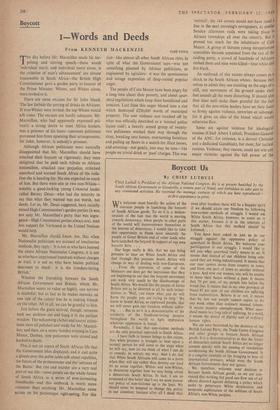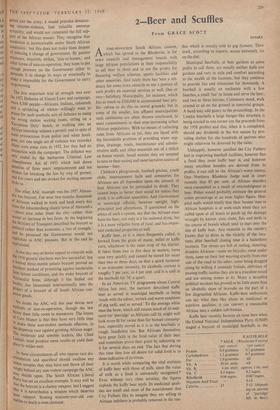Boycott
Words and Deeds From KENNETH MACKENZIE
CAPE TOWN
THE day before Mr. Macmillan made his sur- prising and stirring speech—those words 'individual merit, and individual merit alone, is the criterion of man's advancement' are almost treasonable in South Africa—the British High Commissioner gave a garden party in honour of the Prime Minister. Whites, and Whites alone, were invited to it.
There are some excuses for Sir John Maud. The law forbids the serving of drinks to Africans. If non-Whites were invited, the top Whites would not come. The excuses are hardly adequate. Mr. Macmillan, who had apparently expressed pri- vately a strong desire to meet Africa leaders, was a prisoner of his hosts—common politeness prevented him from upsetting their arrangements. Sir John, however, is nobody's prisoner.
Although African politicians were naturally disappointed that Mr. Macmillan should have attacked their boycott so vigorously, they were delighted that he paid such tribute to African nationalism, attacked race prejudice, criticised apartheid and warned South Africa of the isola- tion she is heading for. No one expected so much of him. But there were one or two non-Whites- notably a good-looking young Coloured leader called Barney Desai—who had the temerity to say that what they wanted was not words, but deeds. Let us, Mr. Desai suggested, have racially mixed High Commissioner's garden parties (it was not only Mr. Macmillan's party that was segre- gated—High Commission parties always are). And less support for Verwoerd at the United Nations would help.
Mr. Macmillan should know, too, that when Nationalist politicians are accused of totalitarian methods, they reply : 'It is not us who have banned the entire African Nationalist Congress; it is not us who have imprisoned hundreds without charges or trial; it is not us who have beaten political detainees to death : it is the freedom-loving British.'
Whether the friendship between the South African Government and Britain, which Mr. Macmillan seems to value so highly, can survive is doubtful; but as fast as he makes enemies on one side of the colour line he is making friends on the other. All in all, we can be grateful to him.
Just before the guest arrived, though, someone took our skeleton out and hung it in the parlour window. The welcoming clichés and tourist attrac- tions were all polished and ready for Mr. Macmil- lan; and then, on a sunny Sunday evening in Cato Manor, Durban, nine policemen were stoned and hacked to death.
This is not an aspect of South African life that the Government likes displayed, and it cast quite a gloom over the polite table-talk about republics, the future of the protectorates and the 'advance of the Bantu.' But riot and murder are a very real part of our life—some people see the whole future of South Africa as a series of ever-increasing bloodbaths—and this outbreak is worth more attention than anything Mr. Macmillan came across on his picturesque sight-seeing. For this
riot—like almost all other South African riots, in spite of what the Government says—was not something planned by African politicians, or engineered by agitators: it was the spontaneous and savage expression of deep-rooted popular anger.
The people of Cato Manor have been angry for a long time about their poverty, and about apar- theid regulations which keep them humiliated and insecure. Last June this anger blazed into a riot which destroyed £250,000 worth of municipal property. The new violence was touched off by what was officially described as a 'normal police liquor raid'; a heavily armed group of twenty- two policemen worked their way through the slum, breaking into homes, overturning furniture and pulling up floors in a search for illicit brews, and arresting—not gently, you may be sure-144 people on trivial drink or 'pass' charges. This was 'normal'; the 144 arrests would not have rated 3 line in the next morning's newspapers, as similar Sunday afternoon raids were taking place In African townships all over the country. But it proved too much for the inhabitants of Cato Manor, A group of thirteen young inexperienced constables became separated from the rest of (11c raiding party, a crowd of hundreds of African, rushed them and nine were killed—four white and five black.
An outbreak of this nature always comes as a shock to the South African whites: because the!' refuse to admit they are standing on the edge of .3 cliff, any movement of the ground under their feet sounds all the more disturbing. It should also (but does not) make them grateful for the fact that all the non-white leaders have set their faces so firmly against violence, terrorism or sabotage, for it gives an idea of the blood which would otherwise flow.
Some are against violence for ideological reasons (Chief Albert Luthuli, President-General of the ANC, for instance, is a devout Christian and a dedicated Gandhian), but most, for tactical reasons. Violence, they reason, could not win anY major victories against the full power of the Police and the army; it would provoke devastat- ing counter-violence, lose valuable overseas sYmPaihY, and would not command the full sup- port of the African masses. They recognise that revolution is inconceivable under South African conditions; but this does not make them despair of inducing a change of government. By passive resistance, boycotts, strikes, 'stay-at-homes,' and Other forms of non-co-operation, they hope to put enough pressure on the Government either to Persuade it to change its ways or eventually to make it impossible for the Government to carry O n governing.
The first important trial of strength was over the 1952 Defiance of Unjust Laws and campaign, When 8,500 people—Africans, Indians, coloureds and a sprinkling of whites—willingly went to Prison for such symbolic acts of defiance as using the wrong station waiting room, sitting on a 'Europeans Only' bench, or walking into an African township without a permit; and in spite of some provocation from police and white hooli- gans, not one single act of violence was recorded (there were some riots in 1952, but they had no connection with the campaign). The defiance was Only ended by the barbarous Criminal Law Amendments Act of 1953 which laid down Penalties of three years' imprisonment and ten strokes for breaking the law by way of protest, and five years and ten strokes for inciting anyone lo do so.
The other ANC triumph was the 1957 Alexan- dra bus boycott. For over two months thousands of Africans walked to work and back every day front the Johannesburg shanty town of Alexandra —about nine miles from the city—rather than accept an increase in bus fares. At the beginning the Minister of Transport described the boycott as P°Iitical rather than economic, a 'test of strength,' and he promised the Government would not capitulate to ANC pressure. But in the end he capitulated.
A one-day stay-at-home appeal to coincide with the 1958 general elections was less successful; but a limited three-month potato boycott proved an excellent method of protesting against intolerable „ :arin labour conditions, and the wider boycott of Nationalist firms, although it has fizzled out i ()callY, has blossomed internationally into the Project of a boycott of all South African con- suhler goods.
No doubt the ANC will this year devise new leaves of non-co-operation, though the law leaves them little room to manceuvre. The lesson °, f Cato Manor is that they have very little time the make these non-violent methods effective, in h desperate race against growing African anger. The moderate and sensible leaders, like Chief Luthuli must produce some results or yield their Place to wilder men.
In these circumstances all who oppose race dis- crimination and apartheid should swallow any rninor scruples they may have and throw all their Weight behind any non-violent campaign the ANC nlaY decide upon. The South African Liberal party has set an excellent example. It may well be t at the boycott is a clumsy weapon; but I suggest that it is nevertheless a weapon which deserves Your support. Stoning nineteen-year-old con- sables to death is even clumsier.







































 Previous page
Previous page